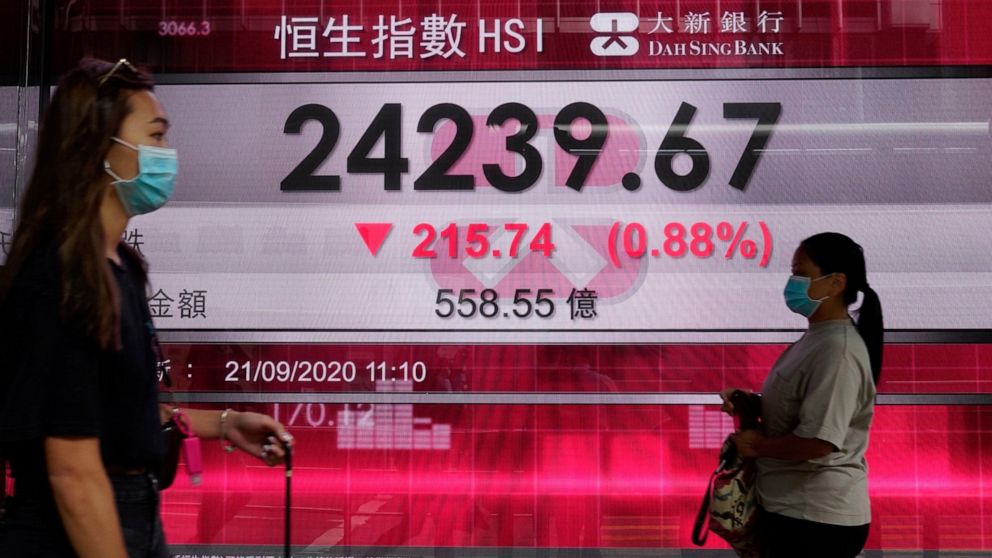Wall Street joins global tumble, S&P 500 down more than 2%
NEW YORK — Stocks are falling sharply on Wall Street Monday, joining a global tumble for markets as the S&P 500 sinks more than 2%.
Losses began in Asia as soon as trading opened for the week, and they accelerated in Europe on worries about the possibility of tougher restrictions there to stem rising coronavirus counts. In the U.S., both stocks and Treasury yields weakened, while prices sank for oil and many other commodities a healthy economy would demand.
The S&P 500 was down 2.5%, as of 10:43 a.m. Eastern time, and the losses were widespread with 95% of the stocks in the index lower.
The Dow Jones Industrial Average fell 827 points, or 3%, to 26,829, and the Nasdaq composite was down 2.3%. In another sign of the increased worry, the yield on the 10-year Treasury sank to 0.65% from 0.69% late Friday.
Wall Street has been shaky this month, and the S&P 500 has pulled back more than 9% since hitting a record Sept. 2 amid a long list of worries for investors. Chief among them is fear that stocks got too expensive when coronavirus counts are still worsening, U.S.-China tensions are rising, Congress is unable to deliver more aid for the economy and a contentious U.S. election is approaching.
Bank stocks had sharp losses Monday morning after a report alleged that several of them continue to profit from illicit dealings with criminal networks despite being previously fined for similar actions.
The International Consortium of Investigative Journalists said documents indicate JPMorgan Chase moved money for people and companies tied to the massive looting of public funds in Malaysia, Venezuela and the Ukraine, for example. Its shares fell 3.7%.
Big Tech stocks were also struggling again, much as they have since the market’s momentum turned early this month. Amazon, Microsoft and other companies had soared as the pandemic accelerates work-from-home and other trends that boost their profits. But critics said their prices simply climbed too high, even after accounting for their explosive growth.
Amazon fell 2.3% and Microsoft lost 1.6%.
Tech’s losses have helped drag the S&P 500 to three straight weekly losses, the first time that’s happened in nearly a year.
Shares of electric and hydrogen-powered truck startup Nikola plunged 17.9% after its founder resigned as executive chairman and left its board amid allegations of fraud. The company has called the allegations false and misleading.
General Motors, which recently signed a partnership deal where it would take an ownership stake in Nikola, fell 7.3%.
Investors are also worried about the diminishing prospects that Congress may soon deliver more aid to the economy. Many investors call such stimulus crucial after extra weekly unemployment benefits and other support from Capitol Hill expired. But partisan disagreements have held up any renewal.
“With 43 days to the U.S. election, fingers crossed may be what little one can do when it comes to the fiscal stimulus hopes,” said Jingyi Pan of IG in a report.
Partisan rancor is only continuing to rise in the country, deflating hopes even more. The sudden vacancy on the Supreme Court following the death of Justice Ruth Bader Ginsburg is the latest flashpoint dividing the country.
Tensions between the world’s two largest economies are also weighing on markets. President Donald Trump has targeted Chinese tech companies in particular, and the Department of Commerce on Friday announced a list of prohibitions that could eventually cripple U.S. operations of Chinese-owned apps TikTok and WeChat. The government cited national security and data privacy concerns.
A U.S. judge over the weekend ordered a delay to the restrictions on WeChat, a communications app popular with Chinese-speaking Americans, on First Amendment grounds.
Trump also said on Saturday he gave his blessing on a deal between TikTok, Oracle and Walmart to create a new company that would likely be based in Texas. The Department of Commerce delayed restrictions on TikTok originally set to go into effect on Sunday by a week. That means TikTok will still be availalbe on U.S. app stores.
Oracle rose 1.7%, and Walmart gained 0.4%, among the few companies to rise Monday.
Layered on top of all those concerns for the market is the continuing coronavirus pandemic and its effect on the global economy.
On Sunday, the British government reported 4,422 new coronavirus infections, its biggest daily rise since early May. An official estimate shows new cases and hospital admissions are doubling every week.
Prime Minister Boris Johnson later this week is expected to announce a slate of short-term restrictions that will act as a “circuit breaker” to slow the spread of the disease. The number of cases has been rising quickly in many European countries and while authorities don’t seem ready to return to the tough restrictions on public life that they imposed in the spring, the new wave of the pandemic threatens the economic outlook.
The FTSE 100 in London dropped 3.6%, with travel-related stocks taking heavy losses, along with other companies that would in particular by more restrictions. Other European markets were similarly weak. The German DAX lost 4.4%, and the French CAC 40 fell 3.8%.
In Asia, Hong Kong’s Hang Seng dropped 2.1%, South Korea’s Kospi fell 1% and stocks in Shanghai lost 0.6%.
———
AP Business Writer Joe McDonald contributed.
![]()


